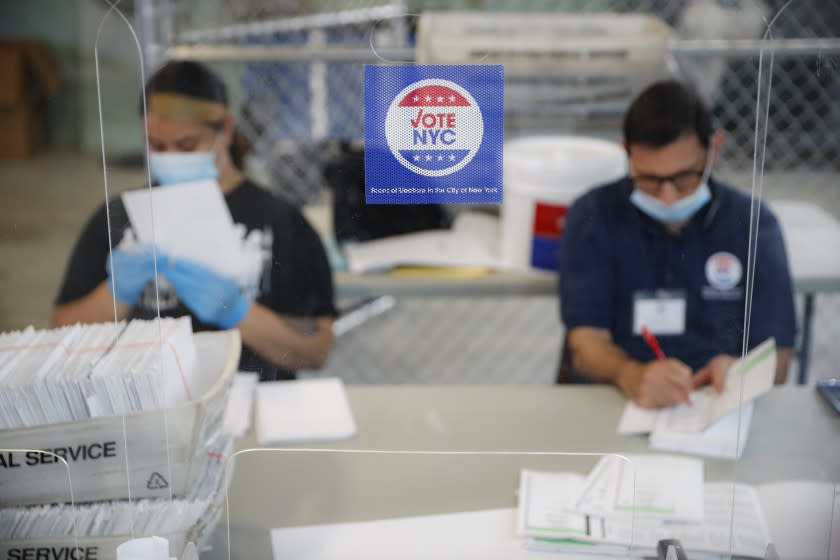Editorial: Six ways to ensure Americans can vote safely amid the pandemic

With only three months to go before the November election and the coronavirus pandemic still a threat to public health, Congress and the states must do much more to help Americans exercise their right to vote without placing themselves in danger.
Several states have responded to the pandemic by making it easier to vote by mail, but that option needs be made even more available. States also need adequate personnel and equipment to ensure that votes cast by mail are fully counted and that voters whose ballots are rejected have the opportunity to appeal, while still providing sanitized polling stations and in-person voting for those who need that option. Finally, a public education campaign is necessary to counter President Trump’s cynical suggestion that a delay in completing the vote tallies and declaring a winner is evidence of fraud.
Here are some specific steps that must be taken — by government and by you — to ensure that the Nov. 3 election lives up to the nation’s democratic ideals.
Provide more aid for state and local election systems.
$400 millionrelief bill $3.6 billionelection experts
Trump has falsely and recklessly accused congressional Democrats of seeking to “increase voter fraud.” But even some Republicans who have recognized the importance of helping state election systems weather the pandemic are resistant to providing detailed instructions to the states on how to conduct their elections during this emergency.
For example, there are legitimate concerns, not confined to Republicans, about so-called “ballot harvesting,” the collection and delivery of multiple ballots by private citizens or party activists. The House-passed bill includes language saying that states can't put limits on how many ballots a "designated person" may turn in. An acceptable compromise would be to provide generous federal aid to state election systems to deal with the pandemic without imposing such a requirement.
Expand early voting.
Ensure that the post office can deliver absentee ballots expeditiously.
hobblestarveconfirmfirst-class mail
Allow a grace period for mailed ballots.
Sign up younger poll workers.
Take the time necessary for an accurate count.
But elections that aren’t resolved on election night aren't inherently suspicious. Election officials, and especially Republican secretaries of state, should publicly contest Trump’s conspiracy theory and explain why the special circumstances of this year’s election are likely to leave many races undecided on election night without any sinister implications.
In the case of the presidential election, Congress should provide states with additional time to process ballots by enacting legislation proposed by Sen. Marco Rubio (R-Fla.). Rubio’s bill would change from Dec. 8 to Jan. 1 the so-called “safe harbor” date by which states must resolve disputes over election results in order to have Congress accept them as conclusive. The bill also would move the date on which the electoral college casts votes from Dec. 14 to Jan. 2. (The bill would have no effect on the date of the inauguration, which is set by the Constitution.)
At the same time, states can and should take steps to expedite the counting of the ballots that arrive early. For example, California Gov. Gavin Newsom has signed legislation allowing county election officials to start processing mail-in ballots 29 days before the election. But in this extraordinary — and extraordinarily important — election year, an accurate tabulation of votes is more important than a speedy one.

